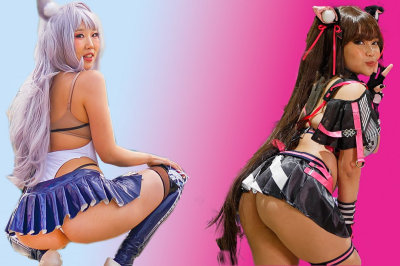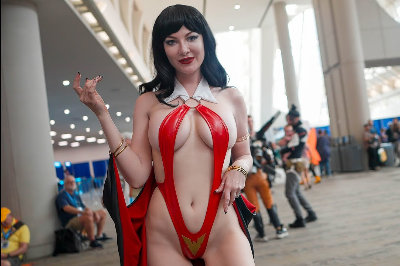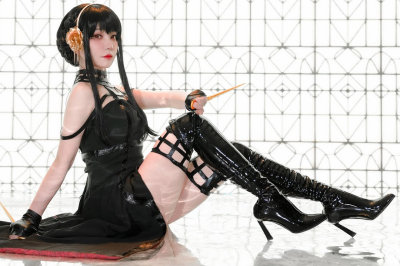DIG! - Q&A with director Ondi Timoner
Seven years in the making, Ondi Timoner's DIG! is a music documentary that sings a hymn to artistic integrity. Detailing the differing fortunes of two bands, The Dandy Warhols and The Brian Jonestown Massacre - in particular focusing on their respective charismatic front men Courtney Taylor and Anton Newcombe - DIG! shows just how fame can have a profound affect on friendship. Timoner, who has made music videos and music documentaries for The Dandy Warhols, Dave Koz, Vanessa Carlton, The Vines, Paul Westerberg and Lucinda Williams, graduated from Yale University and founded her company Interloper in 1994. She filmed the documentaries VOICES FROM INSIDE TIME about incarcerated women in Connecticut, and later, THE NATURE OF THE BEAST, about one woman's heroic journey through the criminal justice system.
How did you get to know The Dandy Warhols?
Through Anton. I was starting with ten bands - it was ten bands on the verge of getting signed and what happens when art and industry meet. Then I heard the music of The Brian Jonestown Massacre, and I thought it was some band from the Sixties that I had somehow missed. Then somebody told me they were alive and well. My brother and I went up there to film them. Within two weeks, they came down to play The Viper Room and had a fist-fight pile-up by the fifth song, with eight labels there to see them I thought this guy, Anton, was totally incredible and insane, and his band was all larger than life characters. He told me to forget about those other bands and come meet The Dandy Warhols. I thought, 'You're not going to take over my documentary but I'm not going to argue with you because you're obviously a dangerous man!' So I went up to Portland and met the Dandys, and they too were uncompromising characters - or at least set in their aesthetic and just rock stars. They were sure they were cool. They had a certain attitude, and better music, than anything I was filming in LA.
Obviously, you had no idea that this rivalry would develop between the bands. So how did you first approach filming them?
I wanted to see whether an artist could maintain his integrity. Anton was obsessed with maintaining his integrity; he was obviously self-destructing every opportunity of success. Two weeks into the filming, with all these labels going to see him, and he tried to remove the guest list, claiming all record companies were Mafia. He said, 'Those people can pay to get in'. Then he just tried to incite a riot in The Viper Room. And when I met the Dandys, I thought, 'This band is going to play the game. They're not sell outs by any means, but they want to be acknowledged for their art and they want to be famous and have a great ride doing it.' Each band was each other's favourite band. Courtney possessed everything Anton didn't possess and Anton possessed everything Courtney didn't possess; Courtney became Anton's barometer of success and Anton became Courtney's barometer of integrity. They really looked to each other, as each other's muses. This was a dynamic relationship, where they were doing their own thing but paralleling each other's lives. So I could look at everything I was looking at with the ten bands with these two.
So you could fuse The Dandy Warhols and The Brian Jonestown Massacre into a giant super-group...
That's been suggested. Anton and Courtney would be the ultimate rock star!
Do you think Anton believed he was a musical revolutionary?
Anton had this idea that he was going to change the way the industry operated. This goal was so amazingly heartfelt, and he was so sure he could do it...but he found the industry doesn't change. Maybe it does over time but no one artist can come along and say, 'Now we're going to have forty minute radio songs'. You don't change the format like that. It would be like me entering the feature film world and saying, 'We're not going to cast this movie. I want to set it up without actors.'
You shared the filming with two others, right?
Yes. My brother, David, was around for the first two-and-a-half years. He and I started the film together. My partner, Vasco Nunes, who is a cinematographer, was around for the last two-and-a-half-years - but there was two-and-a-half in the middle too. I could've coped on my own but I'm a filmmaker, not a cinematographer. I shoot, and I shot most of Dig!, but I'm much more comfortable with the digital format or Super 8. I don't go to 16mm, I don't go to 35mm - I don't claim to be able to light in that way. I know what I like and I can frame anything, fast. I operate as a vérité filmmaker. That's the kind of filmmaking I do. Vasco took it to another level, that reflected directly the narrative of where the Dandys were going. They were heading to this plateau of success and thanks to Vasco's contribution on 16 and 35mm, we showed that on a higher format. The true dichotomy comes as all The Brian Jonestown stuff is shot on Super 8, which has a much grainier, grittier, organic, rough-around-the-edges feel.
Seven years is a long time to stay on one story...
I was editing for four of the years, so I thought I may as well continue the story as both bands were alive and well, and the story was continuing. I was supporting the entire financing of the film with jobs. I did a creative series for VH-1, music videos, EPKs...The Dandy Warhols' 'Boys Better' video was the first music video I ever made. My brother and I made that video together. We had been filming the band long before any record company ever wanted to. So we had all this unique footage and Capitol wanted to use it. We came up with the concept that the Dandys took over the Capitol Records building and made it 'Dandyol Records' and filmed the whole things themselves, as if they were making this documentary themselves - and we put the documentary footage in. We loved that video!
But how was it to stay with one project for so long?
It was horrific, on both a financial and psychological level. It was really fun at first. We all believed in the dream and all cutting our teeth together, growing up together - us and the bands. That's why we had such complete access. They knew we were in it for the right reasons, paying for ourselves. We weren't MTV. It was particularly bad towards the end, when I was pregnant - dealing with this animal. It was 2000 hours worth of footage. I had a five-hour cut last summer that I said, 'There's nothing I can cut from this'. I would keep saying, 'I quit!' I never expected it to resonate like this, or for it to be in the permanent collection at the Museum of Modern Art, which it is now. I didn't expect it to be reviewed the way it has; it has surpassed all my expectations. The footage itself, the images, these characters and the sacrifices everyone made keeping their lives open, is what pushed me to finish this film. I had to finish it to make a document that people could put in their VCRs and say 'Woah!' - even if it was only on tour buses. I knew musicians would appreciate it.
DIG! has arrived in a great year, with SOME KIND OF MONSTER and END OF THE CENTURY also doing the rounds...
I don't think we would've done any worse, had these other films not existed, but I don't think we're doing any better because of them. It's a very interesting trend to note - and it's not a trend that is conscious. The timing of me finishing my film was childbirth - trying to close that chapter and open another one. Of course, I've been talking about IGg! ever since but at least it's a little different than sleeping on the dirtiest couches in Ohio with Anton and getting arrested.
Was it difficult to watch Anton, who became a friend, get hooked on heroin - while you still had a camera in your hand?
Oh, yeah. Very difficult when your close to someone, which I became. But Anton draws people towards him just as fast as he repels them, so he always had people around him to put him in rehab. You heard me lose my cool on the film, when he's yelling at his wife. That was one of two times I was thrown out of the house. As a filmmaker, you're really not supposed to get involved. There was a time when I almost raised money - for Anton to make a record. I was so anxious to see that, to be a part of that, to film that, that I almost did it. But I had to remind myself that I was the documentary filmmaker and not supposed to do anything like that.
Did Anton ever act up for the camera? Or was he very natural?
Very natural. Joel [Gion] is always aware of the camera. He's like the mice in BABE or something! Anton is too immersed to really be aware of the camera. Joel and Matt [Hollywood] said they forgot the camera was there. Courtney never believed I would even finish it; for years, a lot of people thought that.
The Blur-Oasis rivalry is cited in the film. Do you think the bands consciously emulated that, to try and recreate that feeling?
Anton was riding on Courtney's coattails in the press and manipulating the media, but he also truly felt jealous, angry and hurt - a mixture of negative feelings that drove him to stop Courtney. But he was also aware that if he was super-negative about Courtney in the press, he would get press. Whereas, nobody really cared about Anton in the press. People just cared about Courtney. They weren't Blur and Oasis. They weren't as big or selling millions of records. A lot of this was existing in their heads. When I met them, it was like they'd crawled out of some Rolling Stones biography or something.
Where are the bands today?
Courtney is in the studio, writing a record. Joel is buying records for Amoeba Music. He's a real talent and I think filmmakers will put him in films! Anton refuses to speak to me at this point, having seen the film. I have replaced Courtney as the person for him to attack. It must be hard for him to look at these seven years of his life, especially when he remembers everything differently from how it happened. But the camera doesn't lie.
And with Courtney narrating it...
Now they're friends, because he sees how complimentary Courtney was.
Do you want to get into feature filmmaking?
Yes. I'm actually directing two features, slated to go next year. One is starring Thomas Jane; he's playing Glen Shirley, a guy in prison in the early Seventies discovered by Johnny Cash, who gets him out to open for him. And he does, but Glen steals the show and Johnny has to shut him down. It's about how show business can be more dangerous than prison. The other is a Michael London who produced a film called ONE PER CENT MORE HUMAN. It's about two girls who survive a traumatic incident, and how they cope with their pain, their guilt and their denial - and ultimately have to faith the truth. I'm also writing a film called THE DESERTERS, about the fine line between advertising and pornography.
I hear you also have Scottish roots...
Yes, my grandfather's from Scotland. He's no longer alive. We went there on a journey to try and figure out where we were from, but there was very little documentation. All I know is I felt very much at home there and I think it's the most beautiful country in the world. The west coast of Scotland is truly the promised land. This is my grandfather on my mother's side. She was born in the Bronx and my father was born in Brooklyn; so they're both from New York but I was born in Miami, Florida. I was raised there, then I went to school in Connecticut - Yale.
Could you ever make a documentary again after DIG!?
I'm actually slated to make the history of Jamaican music for Chris Blackwell and I'm very excited about that. It will explore the influence this little island had on the rest of the world - which was massive. I also want to film THE BUBBLE - which is about the dot.com era. I'm a little bit burnt on documentaries but every single exploration has its own set of challenges that keeps it alive for me.
Question & Answer Text Copyright Tartan Films



